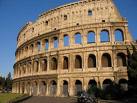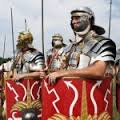
| Next | Previous | Index | Tellout Home |
66. Ancient Roman Luxury
Revelation 18.9-10
"When the earth's kings who committed adultery with her and shared her luxury see her burning smoke, they will weep and mourn over her. Terrified at her torment, they will stand far off and cry, 'Woe! Woe to you, Babylon's mighty city! In one hour, your doom has come!'" (Revelation 18.9-10) ✞
Earth's Kings Weep
 Kings from every land who shared in ancient Rome's luxury will weep and mourn over her collapse. Here we have the earth's kings' mourning song for Ancient Rome. We hear of the negative consequences of Rome's greatness, wealth, and sheer extravagance. Luxury also meant greed and lust. A Talmud proverb says, "ten wealth measures came down into the world, ancient Rome received nine and all the rest only one." One scholar added that in modern times we are babes in enjoyment compared with the ancient world. Another suggested our most extravagant modern "luxury" is poverty compared with Ancient Rome's abundance and magnificence. ✞
Kings from every land who shared in ancient Rome's luxury will weep and mourn over her collapse. Here we have the earth's kings' mourning song for Ancient Rome. We hear of the negative consequences of Rome's greatness, wealth, and sheer extravagance. Luxury also meant greed and lust. A Talmud proverb says, "ten wealth measures came down into the world, ancient Rome received nine and all the rest only one." One scholar added that in modern times we are babes in enjoyment compared with the ancient world. Another suggested our most extravagant modern "luxury" is poverty compared with Ancient Rome's abundance and magnificence. ✞
Merchandise Focal Point
 The world was pouring its "luxury" and riches into Rome's lap. Aristides (BC 530-468), an ancient Athenian statesman nicknamed "The Just," wrote, "the long peace, the seas' safety, and trade freedom had made Rome the entryway for the specialty products and delicacies of every land from the British Channel to the Ganges." "Every land and sea brought merchandise, everything that every season and country produced, river and lake products, Greek and Barbarian arts. If anyone wished to see all these things, he would either have to visit the whole inhabited world or go to Ancient Rome." Many great ships arrived in Rome from around the world at every hour and season. Rome was like a massive factory for luxurious Indian and Arabian cargoes, Babylonian clothing, and ornaments from far-flung lands. Wealth, merchandise, freight, foreign products, precious metals, and every art ended up there. Everything produced and growing came to Rome. ✞
The world was pouring its "luxury" and riches into Rome's lap. Aristides (BC 530-468), an ancient Athenian statesman nicknamed "The Just," wrote, "the long peace, the seas' safety, and trade freedom had made Rome the entryway for the specialty products and delicacies of every land from the British Channel to the Ganges." "Every land and sea brought merchandise, everything that every season and country produced, river and lake products, Greek and Barbarian arts. If anyone wished to see all these things, he would either have to visit the whole inhabited world or go to Ancient Rome." Many great ships arrived in Rome from around the world at every hour and season. Rome was like a massive factory for luxurious Indian and Arabian cargoes, Babylonian clothing, and ornaments from far-flung lands. Wealth, merchandise, freight, foreign products, precious metals, and every art ended up there. Everything produced and growing came to Rome. ✞
Colossal Fortunes
 The money spent on such "luxuries" was colossal. One of Nero's freedmen regarded a man with $1,252,000 as a pauper compared to other Romans. Apicius (BC 25-37 AD), a Roman connoisseur and lover of good food and luxury in the first century AD, squandered $2,000,000 and committed suicide when he had only $200,000 left. He could not live on such a pittance! Apicius compiled a cookery book called "The Art of Cooking." It is the oldest surviving collection of antiquity recipes and is still available in print today! Numerous covers from many museums and private collectors appear on Wikipedia from 900 AD, 1541, 1709, to today. However, many of the original ingredients like "flamingos' tongues" would be impossible to find in our marketplaces. Pliny the Elder (23-79 AD) wrote, "Apicius, the most gluttonous gorger of all spendthrifts, established that the flamingo's tongue had a specially fine flavor." ✞
The money spent on such "luxuries" was colossal. One of Nero's freedmen regarded a man with $1,252,000 as a pauper compared to other Romans. Apicius (BC 25-37 AD), a Roman connoisseur and lover of good food and luxury in the first century AD, squandered $2,000,000 and committed suicide when he had only $200,000 left. He could not live on such a pittance! Apicius compiled a cookery book called "The Art of Cooking." It is the oldest surviving collection of antiquity recipes and is still available in print today! Numerous covers from many museums and private collectors appear on Wikipedia from 900 AD, 1541, 1709, to today. However, many of the original ingredients like "flamingos' tongues" would be impossible to find in our marketplaces. Pliny the Elder (23-79 AD) wrote, "Apicius, the most gluttonous gorger of all spendthrifts, established that the flamingo's tongue had a specially fine flavor." ✞
Emperors' Extravagance
 The emperors were renowned for their extravagance. Emperor Caligula (12-41 AD) spent $200,000, or three provinces' revenues in a single day. In one year, he consumed the equivalent of $40,000,000! Emperor Nero (37-68 AD) declared that money's only use was to squander it, and in a few years, wasted $36,000,000! At one banquet, the Egyptian roses alone cost $70,000. Emperor Caligula was a horse lover and owned one particular stallion named "Incitatus," meaning "swift" or "at full gallop." Incitatus had a marble stall, ivory manger, jeweled collar, and even a house. Caligula planned to make the horse a consul, according to legend! In episode 9 of the movie series "I, Claudius" with John Hurt, Caligula introduces his new senator, "Incitatus," before Claudius' wedding. In the light of these Roman Emperors' excesses, Christians need to re-examine our luxurious Twenty-First Century lifestyles. Dr. William Barclay (1907-1978) pointedly asked, "How do our lives reflect the poor carpenter of Nazareth's holiness and righteousness?" ✞
The emperors were renowned for their extravagance. Emperor Caligula (12-41 AD) spent $200,000, or three provinces' revenues in a single day. In one year, he consumed the equivalent of $40,000,000! Emperor Nero (37-68 AD) declared that money's only use was to squander it, and in a few years, wasted $36,000,000! At one banquet, the Egyptian roses alone cost $70,000. Emperor Caligula was a horse lover and owned one particular stallion named "Incitatus," meaning "swift" or "at full gallop." Incitatus had a marble stall, ivory manger, jeweled collar, and even a house. Caligula planned to make the horse a consul, according to legend! In episode 9 of the movie series "I, Claudius" with John Hurt, Caligula introduces his new senator, "Incitatus," before Claudius' wedding. In the light of these Roman Emperors' excesses, Christians need to re-examine our luxurious Twenty-First Century lifestyles. Dr. William Barclay (1907-1978) pointedly asked, "How do our lives reflect the poor carpenter of Nazareth's holiness and righteousness?" ✞
Eat Drink and Be Merry
 Pearls, gold, and Roman Emperors' extravagance led to society's corruption, and it collapsed. The Roman historian Suetonius (69-130 AD), the director of the imperial libraries, and Emperor Hadrian's private secretary described twelve successive emperors and their opulent ways from Julius Caesar (BC 100-44) to Domitian (51-96 AD). He wrote, "In reckless luxury, Caligula outdid the prodigals in ingenuity, inventing a new sort of bath and unnatural food varieties and feasts. He bathed in hot or cold perfumed oils, drank pearls of great price dissolved in vinegar, and set gold loaves and meats before his guests." He even built galleys with sterns studded with pearls. Suetonius also told us that Nero (54-68 AD) compelled people to set luxurious banquets before him, costing $40,000 each time. "He never wore the same garment twice and played dice for $4,000 a point. He fished with a golden net drawn by purple and scarlet threaded cords. He never journeyed with less than a thousand carriages and shod his mules with silver." The Roman Empire's leaders lived in sheer extravagance and luxury. Rome, however, was about to be ruined for its destruction hour had come! ✞
Pearls, gold, and Roman Emperors' extravagance led to society's corruption, and it collapsed. The Roman historian Suetonius (69-130 AD), the director of the imperial libraries, and Emperor Hadrian's private secretary described twelve successive emperors and their opulent ways from Julius Caesar (BC 100-44) to Domitian (51-96 AD). He wrote, "In reckless luxury, Caligula outdid the prodigals in ingenuity, inventing a new sort of bath and unnatural food varieties and feasts. He bathed in hot or cold perfumed oils, drank pearls of great price dissolved in vinegar, and set gold loaves and meats before his guests." He even built galleys with sterns studded with pearls. Suetonius also told us that Nero (54-68 AD) compelled people to set luxurious banquets before him, costing $40,000 each time. "He never wore the same garment twice and played dice for $4,000 a point. He fished with a golden net drawn by purple and scarlet threaded cords. He never journeyed with less than a thousand carriages and shod his mules with silver." The Roman Empire's leaders lived in sheer extravagance and luxury. Rome, however, was about to be ruined for its destruction hour had come! ✞
Dissolved Pearl Drinks
 In this ancient Roman society, elites consumed dissolved pearl drinks worth thousands of dollars. Cleopatra (BC 69-30) drank a dissolved pearl worth $160,000. Pearls consist of calcium carbonate in minute crystalline form deposited in concentric layers. When a pearl drops into white vinegar, its acetic acid reacts with its calcium carbonate, releasing carbon dioxide and dissolving it. Vinegar in time became the best way to authenticate a pearl. A small drop of vinegar causes it to fizz, indicating a genuine pearl. Fake pearls don't react to vinegar. According to the first-century historian Pliny (61-113), Cleopatra once dissolved a large pearl in a wine goblet and drank it to win a wager with Mark Antony. Dr. William Barclay in "The New Study Bible" tells us that "Valerius Maximus (14-37 AD) at one feast set a pearl drink before every guest. Horace or "Quintus Horatius Flaccus" (BC 65-8), the Roman poet once claimed he swallowed Metalla's pearl earring to say that he had swallowed a million sesterces worth $1.35 million today at a gulp." ✞
In this ancient Roman society, elites consumed dissolved pearl drinks worth thousands of dollars. Cleopatra (BC 69-30) drank a dissolved pearl worth $160,000. Pearls consist of calcium carbonate in minute crystalline form deposited in concentric layers. When a pearl drops into white vinegar, its acetic acid reacts with its calcium carbonate, releasing carbon dioxide and dissolving it. Vinegar in time became the best way to authenticate a pearl. A small drop of vinegar causes it to fizz, indicating a genuine pearl. Fake pearls don't react to vinegar. According to the first-century historian Pliny (61-113), Cleopatra once dissolved a large pearl in a wine goblet and drank it to win a wager with Mark Antony. Dr. William Barclay in "The New Study Bible" tells us that "Valerius Maximus (14-37 AD) at one feast set a pearl drink before every guest. Horace or "Quintus Horatius Flaccus" (BC 65-8), the Roman poet once claimed he swallowed Metalla's pearl earring to say that he had swallowed a million sesterces worth $1.35 million today at a gulp." ✞
Extraordinary Gluttony
 In a tremendously gluttonous and luxurious age, hosts served dishes of peacock's brains and nightingale's tongues at many banquets. "Gluttony" from the Latin "gluttire" means "to gulp down or to swallow." Gluttony meant over-indulgence of food, drink, or wealth items as status symbols. Vitellius (15-69 AD), Emperor for less than a year, succeeded in spending $14,000,000, mainly on food. Emperor Suetonius (70-130 AD) described his favorite dish, "He mingled pikes' livers, pheasants' and peacocks' brains, flamingos' tongues, and lampreys milk, brought by his captains from Parthia to the Spanish strait." Such was the Emperor's and the ruling elite's great gluttony! ✞
In a tremendously gluttonous and luxurious age, hosts served dishes of peacock's brains and nightingale's tongues at many banquets. "Gluttony" from the Latin "gluttire" means "to gulp down or to swallow." Gluttony meant over-indulgence of food, drink, or wealth items as status symbols. Vitellius (15-69 AD), Emperor for less than a year, succeeded in spending $14,000,000, mainly on food. Emperor Suetonius (70-130 AD) described his favorite dish, "He mingled pikes' livers, pheasants' and peacocks' brains, flamingos' tongues, and lampreys milk, brought by his captains from Parthia to the Spanish strait." Such was the Emperor's and the ruling elite's great gluttony! ✞
Trimalchio Banquet
 Petronius, otherwise known as Gaius Petronius Arbiter (927-66 AD), was a Roman courtier during Nero's reign. He devoted himself as a senator to a life of pleasure. Petronius was considered by Pliny the Elder "the elegance judge" in Emperor Nero's court. He wrote about the fictional Trimalchio dinner, which has become shorthand for the ruling elite's worst excesses. "Each course represented one of the twelve zodiac signs." They included chickpeas, beefsteak, kidneys, crab, a sow's udder, different deserts, sea scorpion, fish, African fig, lobster, goose, and two fish mullets! Another dish was a large boar, with baskets of sweetmeats hanging from its tusks. A massive bearded hunter pierced its side with his hunting knife, and from the wound, there appeared a thrushes' flight captured in nets as they flew about the room. At the meal's end, strange sounds in the ceiling and the whole apartment's quaking startled the guests. As they raised their eyes, the roof suddenly opened, and a large circular tray descended, with a Priapus figure, a minor Greek fertility god, bearing fruits and bonbons. When John of Patmos was writing, poverty was widespread. The insanity, wanton extravagance, and luxury such as Trimalchio's dinner invaded Rome and eventually contributed to its downfall. ✞
Petronius, otherwise known as Gaius Petronius Arbiter (927-66 AD), was a Roman courtier during Nero's reign. He devoted himself as a senator to a life of pleasure. Petronius was considered by Pliny the Elder "the elegance judge" in Emperor Nero's court. He wrote about the fictional Trimalchio dinner, which has become shorthand for the ruling elite's worst excesses. "Each course represented one of the twelve zodiac signs." They included chickpeas, beefsteak, kidneys, crab, a sow's udder, different deserts, sea scorpion, fish, African fig, lobster, goose, and two fish mullets! Another dish was a large boar, with baskets of sweetmeats hanging from its tusks. A massive bearded hunter pierced its side with his hunting knife, and from the wound, there appeared a thrushes' flight captured in nets as they flew about the room. At the meal's end, strange sounds in the ceiling and the whole apartment's quaking startled the guests. As they raised their eyes, the roof suddenly opened, and a large circular tray descended, with a Priapus figure, a minor Greek fertility god, bearing fruits and bonbons. When John of Patmos was writing, poverty was widespread. The insanity, wanton extravagance, and luxury such as Trimalchio's dinner invaded Rome and eventually contributed to its downfall. ✞
"Ancient Roman Luxury"
by Ron Meacock © 2021
| ^Top Page | Next | Previous |